May 24, 2025 | 16:29 GMT +7
May 24, 2025 | 16:29 GMT +7
Hotline: 0913.378.918
May 24, 2025 | 16:29 GMT +7
Hotline: 0913.378.918
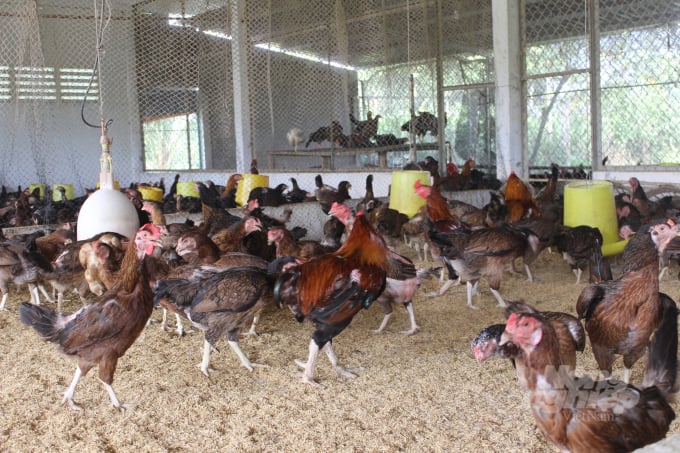
: Biological pads are used in a poultry farming. Photo: Huu Duc.
Local breeders has shifted to livestock biosecurity in the Mekong Delta localities while biotechnology is now believed to be an important key in large-scale farms.The move came after local breeders suffered damages due to diseases on livestock and poultry over the past time.
Therefore, probiotics become an effective alternative to create clean livestock products for consumers.
Using probiotics has helped the ratio of getting diseases of cattle and poultry being reduced and saving the cost of animal feed and medicine.
Le Thi Hai Yen, Vemedim Research and Development Centre said probiotics are being widely used to control diseases and increase resistance for cattle and poultry.
Probiotics, which are very different from chemical and antibiotic measures, provide a new sustainable safe method for breeders as well as consumers, she said.
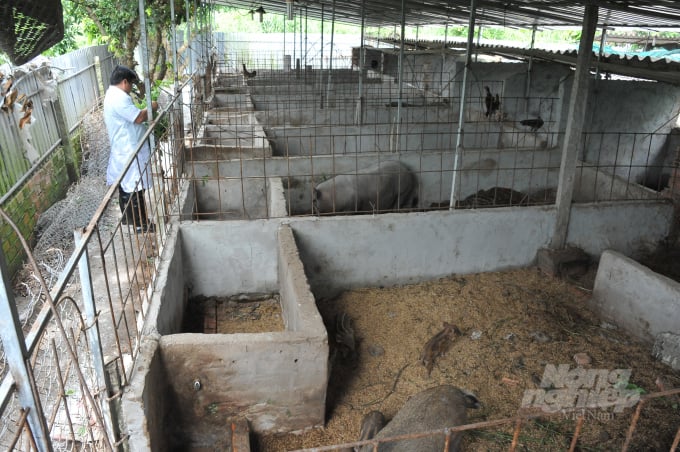
Biotechnology is now believed to be an important key in large-scale farms in the Mekong Delta. Photo: Huu Duc.
Specifically, probiotics stabilise the intestinal microbiota of cattle and poultry, increasing beneficial bacteria and reducing harmful bacteria, she said.
Besides, they are also used in environmental treatment, reducing the odor of the barn, she said.
The centre has invested in a modern fermentation line system and selected microbial strains with the best probiotic features, aiming at sustainable livestock production in the Mekong Delta region in recent years after getting results of research and experimentation, she said.
Through clinical trials and practical use in farming areas in the region, products of Bactozyme, Lactozyme, LacProbi, Probiotic, Probi P, Vime-Subtyl and Edwarsiella have showed that it helps to reduce the use of antibiotics, she said.
Currently, leading experts and scientists from institutes and universities nation-wide have co-operated with the centre in researching and developing probiotic products for cattle and poultry.
Each veterinary and aquatic probiotic products must have at least two years of research and testing through several stages, from diluting and mixing excipients in the laboratory to piloting the products in cattle and poultry in reality, before bringing the products for sale to the market.
The products then will be re-evaluated many times by the appraisal system at institutes, universities and a network of collaborators in the system of farms and breeders.
Only when all the tests reached the stability, absolute safety and the highest efficiency, the centre starts its production.
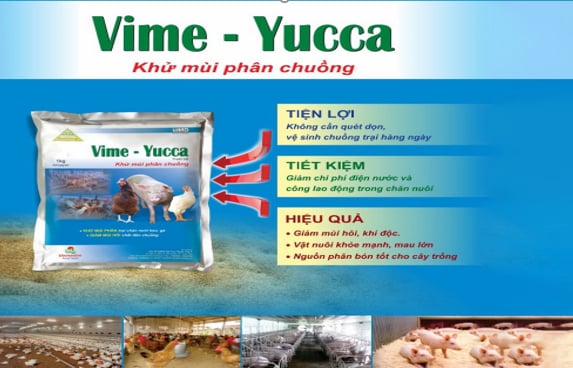
Vime-Yucca biological pads eliminate all barn odors. Photo: Huu Duc.
In recent years, the centre has launched two probiotic products for livestock farmers and received positive feedbacks. The products consist of + Enzyme – Probisol and Vime-Yucca.
Probisol is a completely soluble microorganism, to prevent disease instead of antibiotics, stimulate digestion as well as prevent diarrhea. Probisol has been shown to reduce coccidiosis in chickens, reduce diarrhea in pigs and increase milk production in dairy cows up to 33 per cent.
Another outstanding product, that has been chosen by many local breeders, is the Vime-Yucca biological pads. It is designed to eliminate all barn odors and breeders only need to use it once in one breeding season.
Biological pads are used to put on the floor of livestock cages. The biological pads are covered by a layer of beneficial microorganisms on its surface. The beneficial microorganisms have the main effect of breaking down feces and urine released by livestock, limiting the generation of bad gases and destroying harmful microorganisms. One of the biological pads’ conveniences is helping to keep cattle and poultry warm during the cold weather.
This is believed to be a convenient product. Using the product, breeders do not need to sweep and clean the barn every day. It also helps them to reduce cost of electricity, water and labour in animal husbandry.
In terms of efficiency, it helps in saving 10 per cent of food cost, keeping the farming environment unpolluted by reducing odors, toxic gases, making animals healthy, growing quickly as well as creating a good source of organic fertilizer for plants.
Translated by Thu Hang
/2025/05/22/5250-1-184853_288.jpg)
(VAN) According to a representative from the Central Retail Vietnam, Vietnamese products such as seafood, sweet potatoes, dragon fruit, coffee, and spices hold great potential in the Thai market.
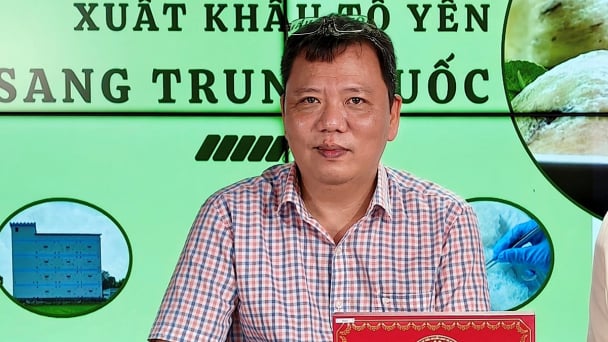
(VAN) A multi-channel, multi-directional strategy only works when the agricultural value chain meets global transparency and SPS standards.
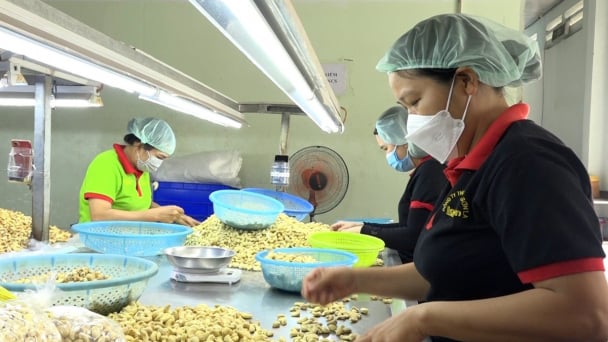
(VAN) Market expansion is a matter of survival for Vietnamese businesses amid fierce competition and global supply chain fluctuations.
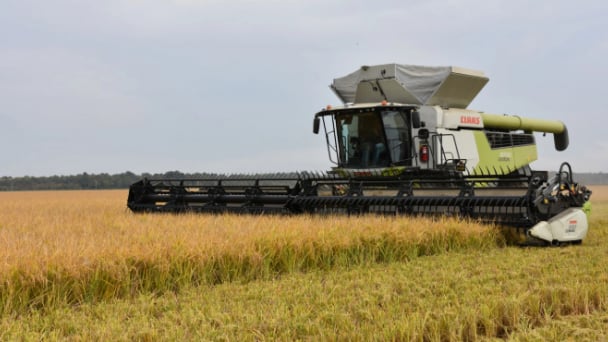
(VAN) Global market prospects for U.S. long-grain rice for the upcoming marketing year.
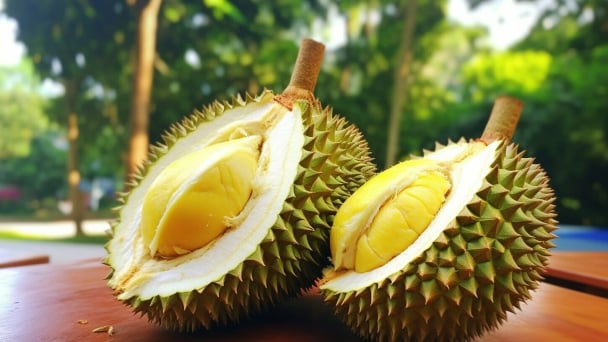
(VAN) China’s General Administration of Customs started permitting fresh durian shipments from Cambodia after a phytosanitary protocol was signed with the Cambodian Ministry of Agriculture in late April.
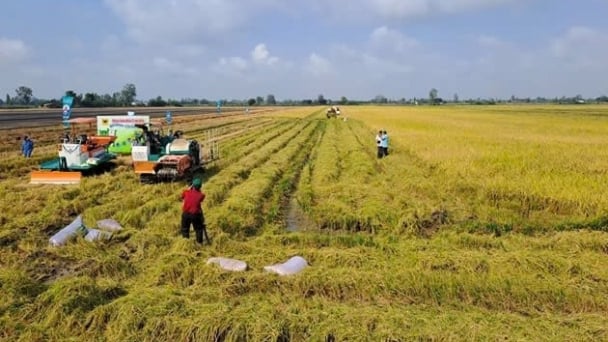
(VAN) To operate carbon market, one of the key issues is determining which types of 'commodities' meet the standards to be traded on the market.
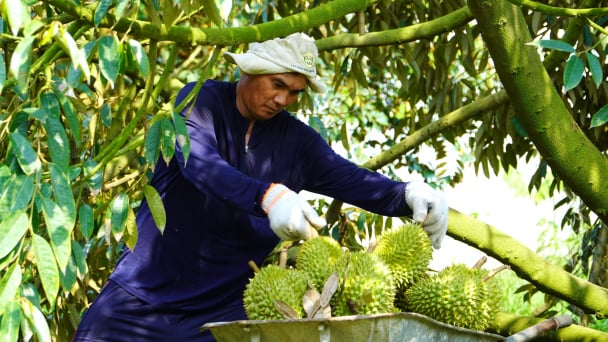
(VAN) Durian-producing localities need to coordinate more effectively with central authorities to improve the traceability, monitoring, and response systems in case of violations.